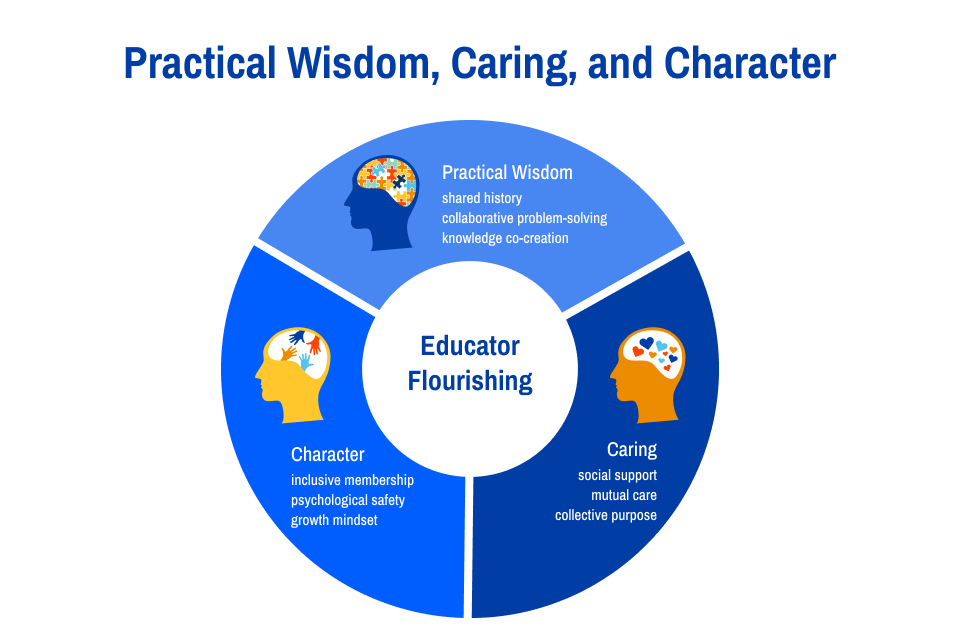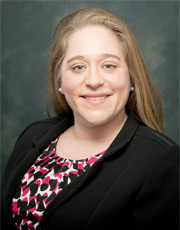Community as a Pathway to Flourishing for Medical Educators
Ensuring that medical and biomedical educators are part of an educator community in support of flourishing has never been more essential. An educator community is a group of educators who trust each other, support each other, engage in activities together, and feel that they belong. A strong educator community can support flourishing, which includes happiness, life satisfaction, mental health, physical health, purpose, meaning, self-acceptance, autonomy, optimism, mastery, self-determination, vitality, engagement, self-esteem, and commitment to personal growth. Members of educator communities in support of flourishing rely upon shared experiences and a collective sense of identity to deepen their knowledge and expertise as teachers, learners, and leaders. This benefits all members of the educator community as well as the institution through enhanced psychological safety, improved openness to change, and a more positive learning environment.
Practical Wisdom, Caring, and Character for Educator Flourishing
The Kern National Network framework of practical wisdom, caring, and character can serve as a foundation from which to explore how flourishing can be encouraged through community. These include:
Practical wisdom within a community: An educator community in support of flourishing shares a knowledge of culture and history while also making room for and integrating new members with an array of prior training and work experience. This enables community growth through the consideration of outside ideas and fresh perspectives which can support collective problem-solving. Professional knowledge is crucial for effective practice, and by sharing individual knowledge, educators can have a deeper understanding of teaching and learning practices, and the ability to cultivate and implement new ideas. This collective knowledge benefits all members of the educator community.
Our CEDAR Community Blog is one way that CEDAR encourages the sharing of practical wisdom in our SLU SOM educator community. We engage members of our community in the collaborative identification of topics of interest and co-create knowledge with them, which we freely share with our community. We then discuss these topics publicly at our CEDAR Community Blog Post Discussion Circles.
Caring within a community: An educator community in support of flourishing engages in social support, mutual care, and a collective purpose which contributes to the well-being and collaborative success of that community. Opportunities to connect, network, and collaborate on topics of shared interest can spark new ideas and foster continuous improvement. Community members become part of something greater than themselves, by caring for their individual and the community’s collective identity. A community with a blend of members from throughout the career spectrum with a flattened social hierarchy who feel welcome to participate can support individual well-being and institutional morale. The community can also rely on members during challenging times as there may be a collective sense that there is a shared value to being a part of the community.
Our CEDAR PRIMED Initiative is one way that CEDAR encourages caring in our SLU SOM educator community. We engage members of our community in the collaborative investigation of topics of interest them with the goal of educational improvement for our faculty, staff, and students. We will share the results of our work with leaders and other interested stakeholders in the hopes that our findings improve student experiences with mentoring, student access to research opportunities, student clinical evaluations, and clinical faculty identity.
Character within a community: An educator community in support of flourishing is one in which members experience psychological safety, which allows them to share challenges and concerns. This can foster a more inclusive and respectful workplace and learning environment. Inspire and support communities that champion readiness to learn and have an openness to new ideas. Flourishing communities encourage a growth rather than fixed mindset through openness to giving and receiving feedback. This, in turn, can help members of the educator community educator strive for excellence in their workplace activities, and encourage professional growth.
Our CEDAR Consultations are one way that CEDAR encourages character within a community. We provide complementary consultations with members of our community on curriculum development, program evaluation, or education-focused scholarly projects in which we offer improvement-focused guidance. We also provide peer observation of teaching consultations, in which we observe your in-person or virtual teaching and provide structured feedback to improve.
 Benefits of Engaging Within a Flourishing Community
Benefits of Engaging Within a Flourishing Community
Members of educator communities in support of flourishing who connect on a professional level and work with a common purpose can experience enhanced professional identity and satisfaction. They may experience additional benefits such as improved well-being, reduced burnout, diminished impostor phenomenon, enhanced meta-cognitive practices, and strengthened professional identity, all of which are positive for educators. These benefits can foster a sense of belonging and increased trust within the community, which can support increased morale and enhanced workplace retention. This ultimately benefits the institution in the demanding medical and biomedical education environment.
Our Jesuit Values and the Pursuit of Flourishing
A strong mission is essential for educator communities in support of flourishing. Our mission is rooted in our Jesuit values that encourage us to reflect upon our educational endeavors and to seek deeper purpose and connection in our intellectual pursuits. Cura Personalis or “care for the whole person” encourages us to build healthy communities that encourage individual educators to flourish. Teachers and learners should continually pursue deeper knowledge and enhanced connections so that we support our individual and collective professional growth. Those who are members of flourishing educator communities may be better able to embrace evidence-based teaching and learning practices, such as backward design, formative feedback, and active learning, ultimately encouraging a more positive learning environment for all faculty, staff, and trainees. Ultimately, reflection on action and critical thought can provide meaning to members of educator communities in support of flourishing, reinforcing commitment to shared institutional values.
At CEDAR we work to champion these values in support of our flourishing as medical and biomedical educators. Interested in joining our growing and wonderful CEDAR educator community? Email us at CEDAR@health.slu.edu.
 Kristina Dzara, Ph.D., is the Assistant Dean for Scholarly Teaching and Learning,
Director of the Center for Educator Development, Advancement, and Research (CEDAR),
and Associate Professor of Family and Community Medicine at the Saint Louis University
School of Medicine. She holds a Ph.D. in Sociology from Southern Illinois University
and a Master’s in Medical Education from Harvard Medical School. Kristina’s areas
of professional interest include educator development and educational scholarship.
Kristina can be contacted via email or followed on LinkedIn.
Kristina Dzara, Ph.D., is the Assistant Dean for Scholarly Teaching and Learning,
Director of the Center for Educator Development, Advancement, and Research (CEDAR),
and Associate Professor of Family and Community Medicine at the Saint Louis University
School of Medicine. She holds a Ph.D. in Sociology from Southern Illinois University
and a Master’s in Medical Education from Harvard Medical School. Kristina’s areas
of professional interest include educator development and educational scholarship.
Kristina can be contacted via email or followed on LinkedIn.